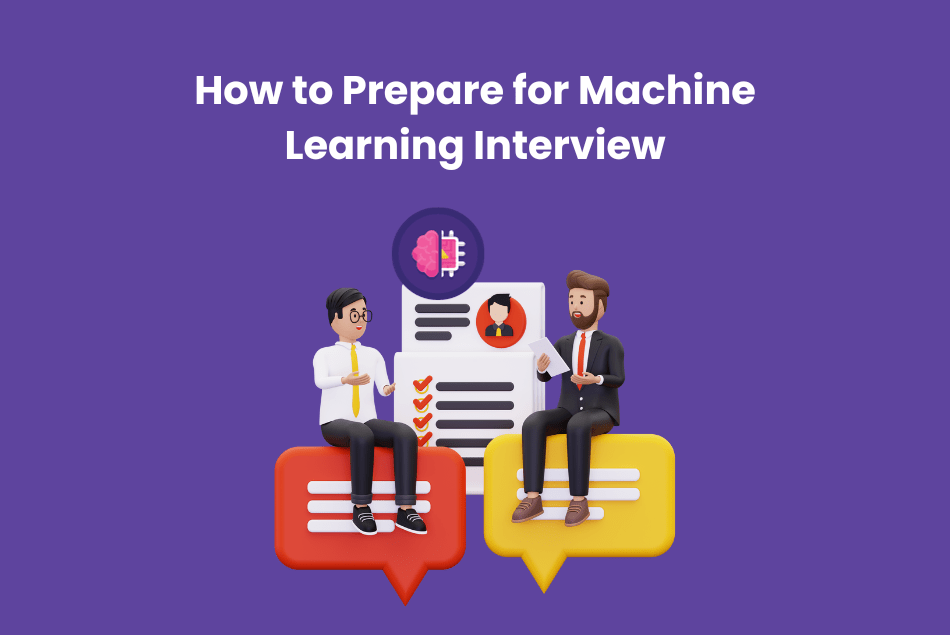How to prepare for a Machine Learning Interview

As technology upgrades significantly every second, so does the demand for skilled professionals in Artificial Intelligence & Machine Learning Training. As organizations integrate machine learning into their operations, the need for proficient individuals who can harness the power of data and algorithms becomes paramount. In this blog, we will explore typical Machine Learning Interview Questions and how to prepare for a Machine Learning interview. Securing a position often hinges on how well one performs during the interview. This step can determine the trajectory of your career in the AI and machine learning domain.
Understanding the Basics
It is crucial to have a firm understanding of the foundations before diving into the specifics of machine learning interviews. Fundamentally, machine learning is the use of algorithms to let systems learn from data. A strong performance in a machine learning interview requires understanding various types of machine learning, including supervised and unsupervised learning, as well as key concepts such as algorithms, models, and datasets. It also requires an appreciation of the significance of data pretreatment.
Mastering Essential Machine Learning Algorithms
Algorithms are at the heart of many machine learning interviews. The fundamental areas to concentrate on are supervised and unsupervised learning algorithms, regression, classification, clustering, and reinforcement learning. Knowing these algorithms, their applications, and how they work in real-world circumstances will help you stand out from the crowd.
Preparing Your Data
The lifeblood of machine learning is data. Your ability to manage data, from collection and cleaning to feature engineering and transformation, is frequently evaluated by interviewers. Proficiency in choosing pertinent features, normalizing data, and understanding approaches for cleaning complicated datasets are essential. Being skilled in data preparation guarantees that the models you create are founded on dependable, high-quality data.
Exploring Advanced Topics
While learning the fundamentals is crucial, knowledge of advanced areas can help you develop your career. Neural networks, deep learning, natural language processing (NLP), and computer vision are cutting-edge technologies that are transforming a variety of industries. A thorough mastery of these subjects demonstrates your versatility and interest in cutting-edge technologies.
Hands-On Projects and Practical Experience

It is common for theories to fall short in interviews if it is not put into practise. Participating in Kaggle competitions, working on cooperative open-source projects, and working on practical projects can all yield priceless experience. Real-world projects show that you have the capacity to convert theoretical knowledge into workable solutions, which is a highly valued competence in the industry.
Interview Preparation Strategies
Getting ready for interviews with machine learning requires a systematic approach. It is vital to review fundamental ideas, get some practise with questions that are frequently asked at interviews for machine learning jobs, and get ready for behavioural and scenario-based tests. In addition, having knowledge of the organisation you will be interviewing with and adapting your preparation in accordance with that knowledge can provide you with an advantage over other candidates.
Soft Skills for Machine Learning Professionals
Soft skills, in addition to technical proficiency, are becoming more and more important success factors. Organisations seek machine learning specialists with the following qualities: critical thinking, problem-solving capabilities, adaptability, continual learning, and effective communication and presentation talents. Developing these abilities can improve your profile as a whole.
Resources and Further Learning

Continuous learning is a hallmark of effective AI and machine learning specialists. To stay updated on the latest trends and advancements, utilize resources such as books, online courses, tutorials, networking opportunities, conferences, and research papers. Networking with industry leaders can provide insights and open doors to new prospects.
Follow the steps above on how to prepare for a Machine Learning Interview
You will approach your machine learning interview with confidence if you use the techniques mentioned in this blog, as you will be prepared to handle any obstacle that may arise. Always be yourself, show off your accomplishments and talents with confidence, show that you are excited about the position, and most importantly, prepare well. In any interview scenario, your greatest friends are confidence, practice, and research.




